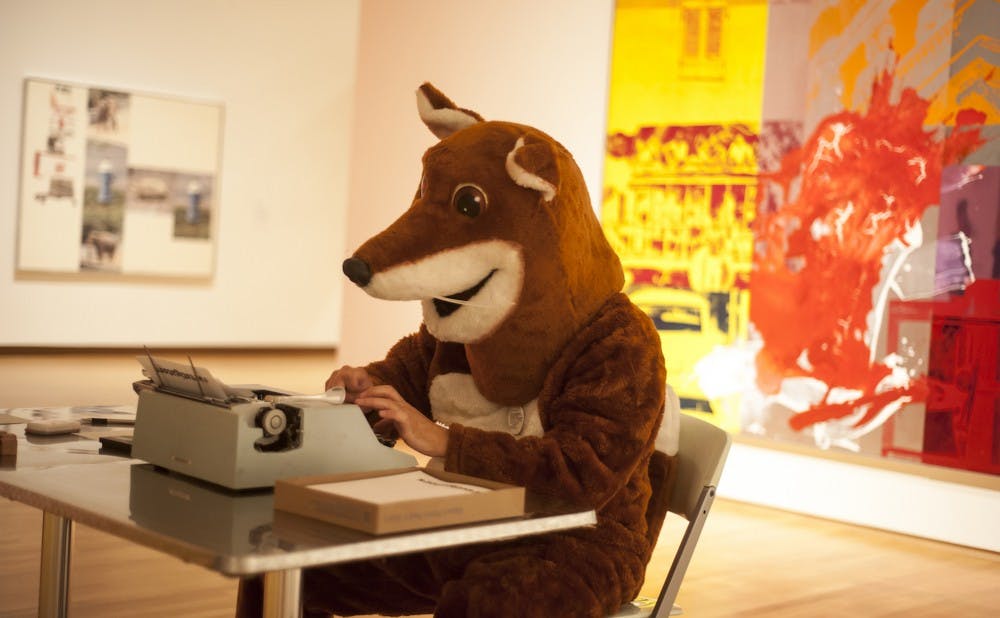When Chris Vitiello, in his fox costume, yanks a piece of paper out of his typewriter and smashes stamps on it, the audience gasps. Also known as Poetry Fox, Vitiello is the center of attention in numerous local events, from the opening of the Rubenstein Arts Center to the Monster Drawing Rally at the NCMA.
Vitiello has been writing poems his whole life. Growing up in a suburb in Northern Virginia near Washington, D.C., he and his family would often travel to museums and bookstores in D.C. He went on to get an M.F.A. in Creative Writing from Naropa University and became a street poet.
But being in public and waiting for people to ask him for a poem was difficult because most people were reluctant to do so. He recalled that it was a little like asking someone for money.
A fox costume that he got from his cousin as a “joke” changed his life as a street poet. On a whim, he began to wear the costume and found more people approaching him for a poem.
“It disarms people,” Vitiello said. “They see a fox and a typewriter and they are like, ‘What is going on?’”
Already working a separate job, Vitiello did not expect that Poetry Fox would become a large part of his life. But as of this year, he has been writing poems in his furry orange costume at local events for six years.
Just as iconic as his costume, though, is Poetry Fox’s typewriter. Vitiello’s love of typewriters began when he was a child, since his family kept several of them in their home. Before he became Poetry Fox, he began to collect typewriters from Ebay and antique stores. He would sometimes get them from his acquaintances, who had been keeping them in their attics and basements for a long time.
The “tactility” of typewriters attracts Vitiello. He likes to take out a piece of paper from his typewriter after he finishes writing and hold it in his hand, as opposed to simply hitting “control-S” on his laptop.
“I hit the keys harder than I really need to, frankly,” he said. “But it’s just enjoyable.”
Vitiello carries out writing each poem like a performance. He begins by asking a person to give him a word to write about. Coming up with a single word to ask a poem about forces people to contemplate what is important to them.
“When you ask what somebody wants a poem about, they just do not think as widely,” he said. “They think about poetry as some idea — but if it is a word, they [think] about themselves.”
He then comes up with multiple directions in which he can take his poem based on the word itself and the demeanor of the person saying it. The final result ranges from simple list poems to narrative poems.
“I cannot really see people … so if you are standing in front of me, I [only] see your knees,” he said. “I can just hear your voice, but you know how they say first impressions are often correct.”
The writing performance ends when Poetry Fox pulls the paper out of his typewriter and stamps the letters “f”, “o” and “x” on it (along with several pawprints and whiskers and ears around the “o”). Vitiello developed this method of signing his poem over the past few years. He got inspiration from another Durham artist, Stacey Kirby, who used rubber stamps in her performance installations, and decided to use numerous rubber stamps he had at home.
But the wooden pawprint stamp — though it sometimes does not make a good impression on the paper — has a more personal connection for him. He got it at a bookstore in Kathmandu when he travelled to Nepal with his father before he became Poetry Fox.
“I just wanted to bring a stamp home and happened to choose that pawprint stamp,” he said.
He enjoys writing poems for everyone, but he said he especially loves doing so for people who need some generosity.
“Sometimes, I’ll just have people come up to me and say, ‘My husband of 39 years passed away last year,’” he said. “This is somebody who is obviously in pain … and it is a pretty terrific thing to try to do something good for them in that moment.”
Although Vitiello has lived in Durham for 24 years, he did not think that it would be a special place for him at first, because there was “not a lot going on.”
“I had to grow up a little bit and realize that if you want something to be going on where you live, you have to do it,” he said. “So it was a matter of finally getting involved … and meeting other people for a project … That is what kept me here and what I’m really proud of. Durham for me is a place where ideas come to fruition.”
Get The Chronicle straight to your inbox
Sign up for our weekly newsletter. Cancel at any time.
Vitiello believes that poetry has a special place in today’s society, which he said is defined by overheated and exaggerated language.
“It is just a different kind of public language and at this particular political moment, public language is pretty messed up,” he said. Poetry “is a different kind of public language that speaks on multiple levels and can communicate in a way that a radio broadcast, a television broadcast, a tweet or a Facebook post really cannot.”
Street poetry to Vitiello is a part of the “activation” process during which poets and other artists come out of their studios to interact with the public and convey messages through their works.

